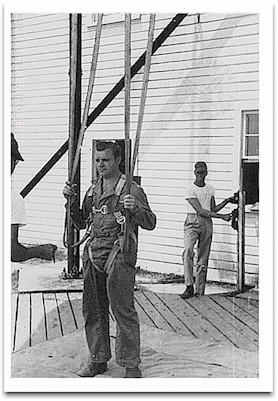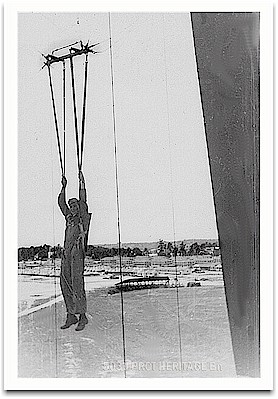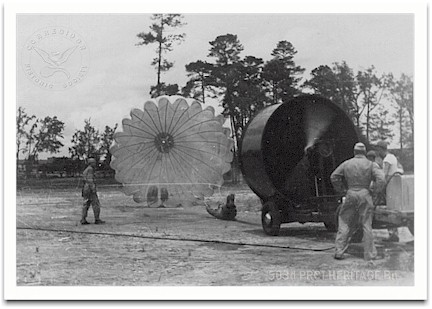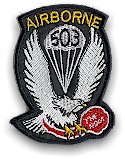|
Now came serious military training. The 26th (Yankee) Division traveled to
North Carolina for large-scale maneuvers. I remember little about them. As
an unofficial noncom I was responsible for getting kitchen trucks to the
right locations in time to feed the troops of the 181st Infantry. We spent
hours upon hours moving from one place to another, never knowing why or
where. During one day of idleness I was summoned to regimental
headquarters. It appeared that Massachusetts Governor Saltonstall was
visiting the regiment and had asked about me. By the time I got to
headquarters he had moved on. I guess he made the gesture as a favor to my
father, then the emergency commissioner of public welfare for the state.
In any event, this high-ranking interest in a lowly private did nothing to
ease my burdens or enhance my standing. I was still a truck driver.
Then the mock war ended and we began the long drive back to our base on
Cape Cod, arriving in early December.
Then it all got serious. On Sunday, December 7, some of us were sitting in
the barracks, talking and joking and cleaning our rifles. We had a radio.
We heard the voice of President Roosevelt. He said the Japanese bad
attacked Pearl Harbor in the Hawaiian Islands, "a day that shall live in
infamy." One of the guys put on his helmet, shouldered a rifle and marched
out the door, declaring death to the Japs.
It looked like we would be in the service of Uncle Sam for a long, long
time. A few weeks later I applied for admission to the army's Officer
Candidate School at Fort Benning, Georgia. My appearance before the
screening committee was uneventful except that I failed to identify the
squad as the basic infantry unit. They approved my candidacy anyway and in
early March I arrived at Fort Benning. There followed three months of
training, much of it similar to the basic training I had undergone as a
draftee. We did get more chances to fire on the rifle range and to
practice with bayonets and to improve our ability to read maps. Then, of
course, there was a lot of spit and polish and, believe it, instruction in
the giving of commands.
All through these three months we could see the tall steel towers in the
distance where would-be paratroopers took their training. A few of us
decided that was what we wanted, not just because of the presumed glory of
it, but also because of the extra $100 a month officers received for the
risk. So, about the time we graduated as second lieutenants, about 100 of
us lined up for interviews. Not all got accepted. I was mildly surprised
to be one of the 25-or-so lucky ones.
Officer school graduates were granted ten days leave before reporting to
their next duty station, I went home to Worcester to see my fiancée, a
girl named Mary Kneass. Way back when I was a lowly GI, I had proposed and
she had accepted. On a weekend visit from Camp Edwards I spoke to her
father -- in a sort of roundabout way asking for his permission to many
Mary. He called for his wife and called for a drink, so I knew it was OK.
Parachute school was rough. The curriculum, if one could call it that, was
divided into four one-week sessions. The first week consisted of mornings
spent in agonizing physical training and afternoons in learning to pack a
parachute. The second week was even worse, more of the same. I can
remember doing deep-knee bends until I fell on my face at the bottom of
each bend. This was the weeks were introduced to the plumber's nightmare,
a giant jungle gym on which were required to act like monkeys. We also did
some exercises in a gymnasium. One of the requirements for continuing was
to climb a 30-foot rope. I failed the first few times; got close, but ran
out of gas. Finally, on the last day, I made it to the top and hung there
until the achievement was recognized.
A minor torture was a suspended parachute harness. This consisted
primarily in repeated chin-ups while holding on to risers. The instructor
in this bit of self-torture was a beefy sergeant who could chin himself
while holding on to the straps with nothing but thumb and forefinger. And
then there was the 40-foot tower, a spindly structure with a hut-like box
at the top. You climbed a ladder to get there and were greeted by an
instructor who handed you a parachute harness and told you to stand in the
doorway cut into one side. A cable ran from the harness to another, long,
inclined cable outside. When you jumped out the door, you fell 15 feet or
so, were caught by the inclined cable and slid to the earth.
When we assembled around the base of this new test the instructor asked
for someone to volunteer to go first. No one spoke up. Since my name began
with A, I knew that with no volunteer I would be ordered to go. So, I
volunteered. When I stood in the door it looked like a long drop to the
ground. I was frightened, but when the instructor yelled "Go!" I went —
and there was nothing to it. Others followed, not all successfully. One
broke his arm when it was struck by a snapping-tight harness riser. An
instructor on the ground made notes on each jump. When all were through I
asked him how I did. He had made the notation "QF" by my name I
asked what it meant. "Quite frightened," he said. And he was right.
|









